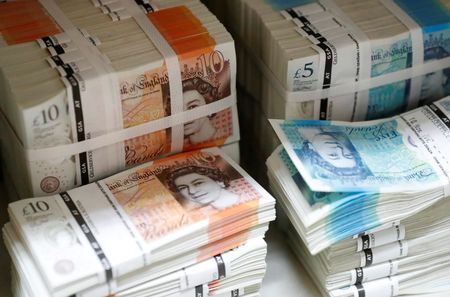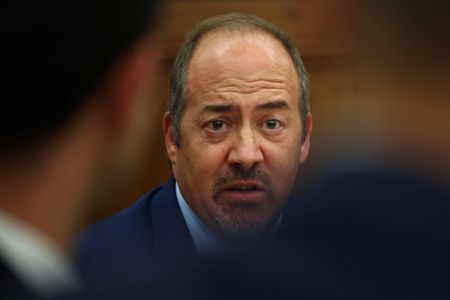By Amanda Cooper
LONDON (Reuters) – The pound eased on Thursday after data confirmed the UK economy entered recession in the second half of last year and as the dollar put on a display of broad-based strength as the month and the quarter end.
Action in the currency market has been dominated this week by the prospect of the Bank of Japan intervening to buy the yen, which has hit its weakest since 1990 against the dollar.
Sterling was last down 0.2%, but was still on course for a 0.2% gain this week against the dollar, ahead of key U.S.
inflation data on Friday. The pound held steady against the euro, which traded at 85.63 pence.
The pound also fell against the yen, dropping 0.24% to 190.79 yen, having hit its highest against the Japanese currency since August 2015 this week.
On the corporate front, Thames Water, Britain’s largest utility, faced a new crisis after shareholders said they would not offer further funding.
British finance minister Jeremy Hunt said the government would continue to monitor Thames Water “very carefully” and that it was still solvent.
The government said last year it was ready for any outcome, including temporary state ownership, if needed, although Thursday’s development had no direct impact on sterling.
“I don’t think it’s a huge story.
The move we’re seeing across the board is pretty broad-based dollar strength and cable is bearing the brunt of that,” Pepperstone strategist Michael Brown said. “It’s pretty much in line with the others so I wouldn’t be too concerned about that.”
On the macro front, UK gross domestic product shrank by 0.1% in the third quarter and by 0.3% in the fourth quarter, unchanged from preliminary estimates, the Office for National Statistics said.
Markets had already factored in a mild recession late last year and the numbers did not trigger an outsized reaction in the pound, or have any impact on expectations for monetary policy.
Last week, the Bank of England opened the door to the prospect of a cut in interest rates, which has prompted a rally in UK government bonds, but undermined sterling.
Two-year gilts, the most sensitive to changes in rate expectations, have fallen 25 basis points in March, heading for their first monthly drop since November.
Futures markets show traders see a roughly 20% chance of the BoE cutting rates at its next meeting in May, although June’s meeting is still the most likely point, with a 55% chance.
(Reporting by Amanda Cooper; Editing by xxxxx)










